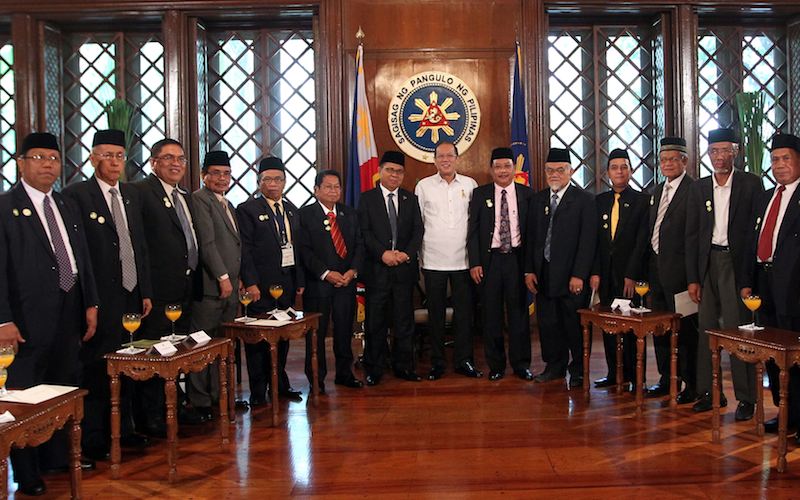'The passage of the proposed Bangsamoro basic law will be an expression of rendering justice to all'
The quest for a just and lasting peace in Mindanao has taken a vicious blow in the wake of the Mamasapano incident on January 25 that has claimed the lives of 44 members of the Philippine National Police Special Action Force, 18 members of the Moro Islamic Liberation Front (MILF), and 7 civilians.
In the aftermath of the tragedy, the passage of the Bangsamoro Basic Law (BBL) has been set back. The BBL was sadly caught in a political cross-fire.
Senator Bongbong Marcos halted the hearing of the BBL, while Senators Allan Peter Cayetano and JV Ejercito withdrew their sponsorships. Emotions have been high with some quarters deliberately fanning the flames of prejudice. There has been a tsunami of social media posts expressing grief, rage, shock and disbelief. Some have called for for sobriety, others for an all-out-war.
The whole nation is mourning.
Cost of war
The noble pursuit to achieve a ‘just and lasting’ peace in Mindanao is never an easy task.
Many have tried, many have failed. Peace is a long journey that requires patience, sincerity, goodwill, political will, and utmost dedication of all concerned and affected sectors, hence, the need for a carefully crafted peace process and the people’s collective and meaningful participation in finding resolution to and addressing the roots of the conflict.
Now we challenge warmongers including those who are flirting with the slogan of an “all-out-war” to kindly and dispassionately look at the costs of Mindanao’s armed conflict, which has directly affected not just Mindanao but the entire country—discouraging foreign and local investments, while also compromising the nation’s coffers with the previous governments spending more on war than basic social services.
Many of the victims are civilians who are either displaced from their communities or killed in crossfires.
Official data reveals that the impact and social cost of the war in Mindanao have been vicious and costly. The conflict has claimed over 120,000 lives, and displaced millions with 982,000 Internal Displaced Persons (IDPs) just in 2000 when then President Estrada declared an all-out-war. And another 600,000 during the failure of the Memorandum of Agreement on Ancestral Domain in 2008.

PEACE PANEL. President Benigno Aquino III poses for a souvenir shot with the Moro Islamic Liberation Front (MILF), led by its chairman Al Haj Murad Ebrahim at Malacañan Palace on Thursday, March 27, 2014. Malacañang Photo
The number of IDPs are estimated at two million since the conflict started in the early 70s, according to International Alert.
Economic losses have amounted to around P640 billion from 1970 to 2001 — that’s P20 billion annually, in terms of damages to businesses, properties, and potential investments in the region.
The 2000 all-out-war policy alone cost P1.3 billion, while the government spent P73 billion on combat expenses in its war with the MNLF from 1970 to 1996.
BBL, not a problem
We, at the Initiatives for International Dialogue – with our decades of peace-building work and conflict prevention in Mindanao – stand firm in our resolve that the Bangsamoro Basic Law (BBL) is not the problem nor the cause of Mamasapano.
In fact, it is an instrument that can help jump start the lasting peace that we all covet. It is the best ticket we have in achieving our elusive dream of peace. The cycle of violence in Mindanao has deep historical roots. Thus, the demand for lasting peace requires revisiting the past before facing the future—failure to do this will simply make the ‘past’ always ‘present.’
We support the call for truth and justice not just for all the fallen in Mamasapano, but for all the peoples of Mindanao who have been suffering decades of historical injustices.
Passing the BBL will be an expression of rendering justice to all. It is more than just passing a law, it is a recognition and admission of the past mistakes committed against the peoples of Mindanao, and the willingness to rectify these injustices.
This most regrettable clash shows us that much remains to be done on our path to genuine peace. Our common cause remains challenged in the countryside, in the halls of Congress, and in the minds and hearts of many Filipinos.
But this is the reality we must address if we are to seek a permanent solution to the so-called Moro question.
The proposed BBL, while imperfect and in need of enhancement, is so far the best alternative we have before us. It is a collective work in progress anchored on 40 years of conflict, negotiations, and lessons learned at a very high cost to many of us. It exemplifies our best expression of engagement, involvement, investment and discourse on the Bangsamoro.
We have long valued the sizable investments made through the years by both parties and their supporters in building mutual confidence and trust, coupled with mutually agreed-upon processes and mechanisms. Thus we remain steadfast in our call for respecting and trusting the mechanisms and processes in place, and staying the course of peace.
[Isagani V. Abunda II is the Media and Advocacy Officer of the Initiatives for International Dialogue (IID), a Philippine-based regional and solidarity advocacy non-government organization. Its main office is in Mindanao. IID is also the secretariat of the Friends of the Bangsamoro, an umbrella of peace organizations that aims to mobilize the broadest mass support to help achieve meaningful and sustainable peace in Mindanao.]

No comments:
Post a Comment
Note: Only a member of this blog may post a comment.